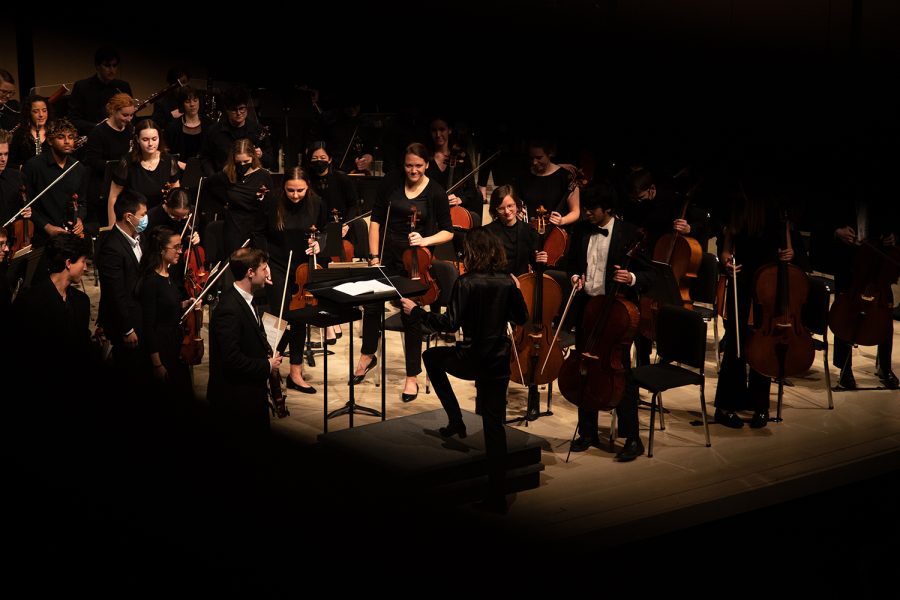UI symphony orchestra’s first performance of the year kicks off with diverse ensemble
The University of Iowa’s symphony’s first performance of the year in the Voxman Music Building plays a diverse range of music.
The UI Symphony Orchestra, led by Dr. Mélisse Brunet, plays in the Voxman Concert Hall on Friday, Sept. 30, 2022.
October 2, 2022
The Voxman Music Building’s concert hall filled with excitement on Sept. 30 as attendees anticipated the start of the University of Iowa’s first symphony performance of the year. Music swelled as performers warmed up, preparing to present audience members with a diverse musical experience.
UI Director of Orchestral Studies Mélisse Brunet said she tried to further the value of diversity with the performance.
“I’m bringing a lot more underrepresented composers to the stage so there is a good mix of big classical masterpieces but also new pieces,” Brunet said. “There are three pieces, and two of them are written by women, which is very seldom to have women composers.”
The first piece was “Totenfeier” by Gustav Mahler. It was packed with emotions ranging from angry, in-your-face rhythms to softer, sweeter melodies. Brunet orchestrated her students with care during the piece.
Brunet hoped her students expressed their emotions through the music and included the audience in this emotional journey.
The second piece, “Concerto for Horn and Orchestra” composed by Francine Aubin had horn soloist Kate Ambrose play alongside the students and faculty of the symphony. This piece sounded more classical and joyful.
Ambrose played her challenging solo with ease. She thought including a more diverse ensemble was immensely important and forward-thinking.
“A more diverse composer population represented means that you’re going to appeal to more people, and that’s really what we should be doing in academia,” Ambrose said. “Making sure that we’re representing the experiences of all our students and not only a hand-picked few.”
The last piece, “Three Latin American Dances,” composed by Gabriela Lena Frank, told a story about the deity of weather. Metal sheets imitated the sound of thunder and lightning, and the echoing cellos cast an intense spell over the audience.
Diversity stood out as a theme both during the concert and in conversations with Brunet and Ambrose.
“We should represent everyone and not only represent the music of the classical period or the music of the romantic period, but we should be representing the music written by our own composers, by our own students, and our own faculty,” Ambrose said. “We should be living in the present of music.”
After the concert, UI second-year student Andrea Lee said the performance met her expectations.
“I thought it [the performance] was really good. I really liked the three Latin American dances because it was very vibrant, and there were a lot of things going on,” Lee said.



